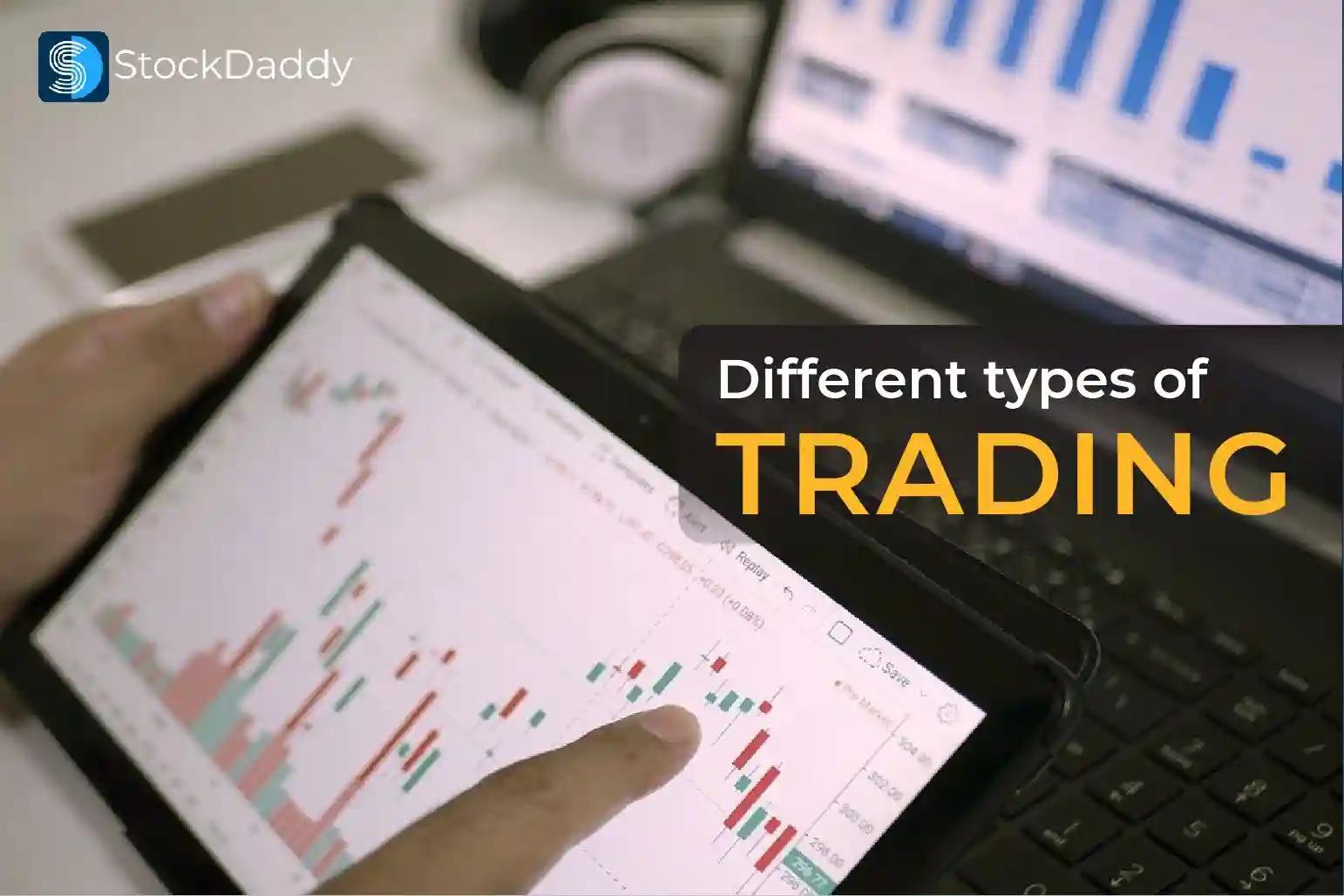Blog >
What are Different Types of Trading?
What are Different Types of Trading?

In the stock market, you’ll come across various types of trading in stock market. Every trading style has its own significance. For best short-term investments, you have to select specific trading methods such as momentum trading strategy, etc. Similarly, different trading methods are implemented for a long-term investment. Here is the list of types of trading in stock market that takes place in India.
Based On Timeframe:
1). Scalping Trading
Scalping Trading is the shortest types of trading in stock market, even shorter than other types of day trading. Scalpers are traders that enter and exit the market quickly in order to earn from a large number of deals over the course of a trading day. Their goal is to make maximum profit from these various small trades to equal the profit they could have made from a single day of bigger profit trading.
2). Day Trading
Day trading is also known as Intraday trading is a type of securities speculation in which a trader buys and sells shares of the day trading stocks on the same trading day, due to this regard, closing all positions before the market hours over for the day to avoid troublesome and inconvenient risks and negative gaps between one day’s close and the next day’s open price. Buy-and-hold and value trading techniques are all available for long-term investments which contrast from day trading.
If you want to be an Intraday Trader, Then you should need to know How To Make Money In Intraday Trading?
3). Swing Trading
Swing trading is a type of trading and speculative trading strategy in financial markets that involves holding a tradable item for one or more days in the hopes of profiting from price variations or swings.' Swing trading positions are often held for a longer period of time than day trading positions, but not as long as buy and hold investing methods, which can be held for months or years. Buying or selling swing trading stocks for a profit is a viable option. Financial analysts have been proven to employ momentum signals (e.g., 52-week high/low) in their swing trading buy and sell recommendations.
4). Positional Trading
It is a basic trading strategy that is completely a vice-versa of intraday trading that assists you to hold your positions in the stock market for a longer period. Positional trading entails using technical and fundamental analysis to assess possible fluctuating market price tendencies. One of the significant advantages of positional trading is that you can perform all of the tasks without spending the entire trading session riveted to the screen.
Know Which One Is Best For You Intraday Vs Delivery Trading

Based On Asset Class
1). Equity Trading
In the financial market, equity trading refers to the purchase and sale of firm shares or stocks. The majority of equity trading relates to the buying and selling of publicly traded firm shares over-the-counter or on a stock exchange.
2). Derivative Trading
Derivatives are contracts whose value is derived from an underlying asset. Stocks, currencies, indexes, and other assets can be used as the underlying asset. Buying and selling derivatives on a stock exchange are known as Derivative Trading.
Derivatives are far more volatile than the underlying assets and allow a trader to speculate on the future price movement of the underlying assets.
Derivative trading has a unique aspect in that it allows a trader to make considerably larger speculative bets and is hence significantly riskier than equities trading. Futures and options trading are the two most frequent types of derivative trading.
3). Currency Trading
The process of purchasing and selling currency pairs is known as currency trading or FOREX trading. Currency pairs are commonly traded, for example, EUR/USD is the most liquid currency pair, indicating the relative value of the Euro to the US Dollar at any given time.
USD/JPY, USD/GBP, USD/CHF, USD/CAD, AUD/USD, NZD/USD, and USD/INR are some of the other popular currency pairs. The forex markets are open all the time, which is a huge advantage of currency trading. However, liquidity and the related bid-ask spread may differ at different times.
Be aware of your Forex Trading Platforms On September 7, 2022, the RBI issued a circular declaring 34 forex trading online platforms as illegal. These include well-known forex trading platforms like OctaFX India, Binomo, and Olymp Trade.
4). Commodity Trading
Commodities are commonly traded assets, just like stocks and currencies. Metals, energy, agricultural, and livestock, and meat are the four main types of traded commodities.
- Platinum, silver, gold, aluminum, and copper are all examples of metals.
- gasoline, heating oil, crude oil, and natural gas are just a few examples of the energy commodities available.
- Corn, soybeans, wheat, rice, cocoa, coffee, cotton, and sugar are just a few examples of the agricultural commodities available.
- Lean hogs, pork bellies, live cattle, and feeder cattle are all examples of livestock and meat commodities.
5). Crypto Trading
The process of speculating on the future price movement of cryptocurrencies in order to profit is referred to as crypto trading or cryptocurrency trading. Crypto trading is a relatively new concept in comparison to the other asset types listed above.
Trading cryptocurrencies may be done in two ways: by speculating on their prices with CFDs or by purchasing digital currencies and hoping for a price increase.
Wrap-Up!
Every investor must know each trading style and its importance. In case you are a beginner in the stock market then this blog is very helpful for you because gaining adequate knowledge of the stock market before starting trade plays a crucial role in your stock market overall journey.

- Recent Blogs
- What is gold Bees ETF and How to invest in it?
- Difference Between Call and Put Option
- Types of Charts in Stock Market
- what is CPSE etf and How is it a good investment Opportunity
- What is Margin Trading Facility
- why Tata Motors Share is Falling?
- Disadvantages of SIP Investment You Should Know
- Can Stock Market make you Rich?
- Difference Between Sensex and Nifty
- Difference Between Fundamental Analysis and Technical Analysis